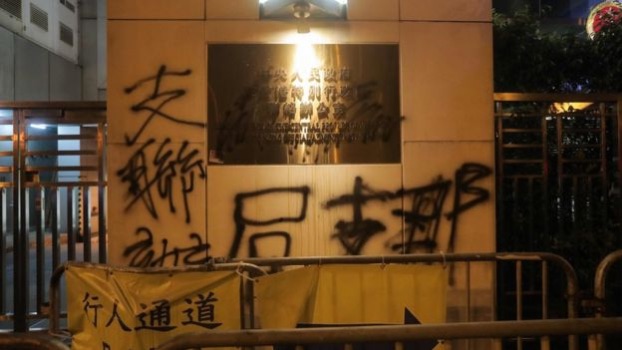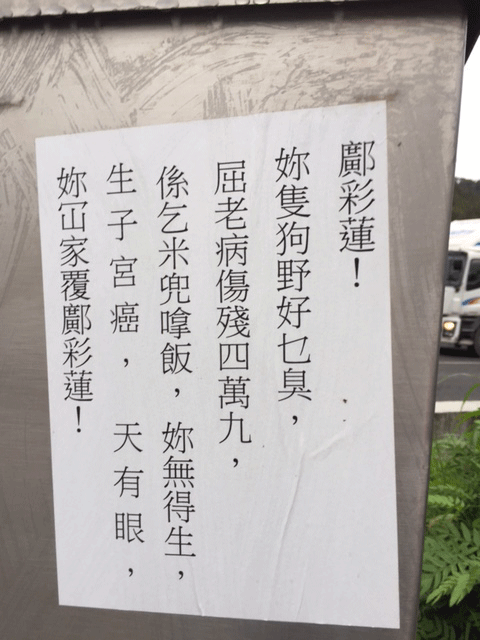Archive for Swear words
April 19, 2020 @ 7:49 am· Filed by Victor Mair under Language and medicine, Swear words
An article in The Economist has two titles in different editions, both datelined March 26, 2020 Amsterdam:
- Typhus off!
"Why Dutch swear words are so poxy
English insults often refer to sex; Dutch ones, to disease"
- Swearing
"Dutch disease
A country where sicknesses are curses"
The content is the same:
Read the rest of this entry »
Permalink
April 9, 2020 @ 6:52 am· Filed by Victor Mair under Idioms, Language and politics, Swear words
Tweet from Heitor@Heitormde:
The 0:36 video was taken just outside the gate of the Chinese embassy in Brasilia.
Read the rest of this entry »
Permalink
October 7, 2019 @ 2:33 pm· Filed by Victor Mair under Puns, Slogans, Swear words, Writing systems
Read the rest of this entry »
Permalink
July 26, 2019 @ 2:20 pm· Filed by Victor Mair under Language and politics, Swear words, Taboo vocabulary
Graffiti painted by protesters in the Liaison Office of the PRC in Hong Kong:

Read the rest of this entry »
Permalink
June 24, 2019 @ 6:04 am· Filed by Victor Mair under Language and politics, Swear words
Four days ago, rumors and reports were flying fast and furious that Alice Mak Mei-kuen, a member of Legislative Council of Hong Kong for the New Territories West constituency, representing the Hong Kong Federation of Trade Unions, swore at the Chief Executive (CE) of the Hong Kong Special Administrative Region (HKSAR) of the People's Republic of China (PRC), Carrie Lam Cheng Yuet-ngor, using the most vile language imaginable:
"Swear words heaped on Carrie Lam as pro-establishment lawmakers express fears of election rout over Hong Kong extradition bill fracas: Lawmaker hurled expletives at Lam as she tearfully explained her decision to suspend the bill; Many fear electoral backlash in November’s district council elections", by Gary Cheung and Tony Cheung, SCMP (6/20/19)
Although the language employed by Mak was, shall we say, quite colorful, I held off on posting on it until I could get better confirmation of her actual words. That came through yesterday evening in the form of these notes from Bob Bauer:
Read the rest of this entry »
Permalink
April 1, 2019 @ 8:53 pm· Filed by Barbara Partee under Insults, Language and culture, Resources, Sociolinguistics, Swear words
I just learned via the mosling mailing list that a Russian team has established a multilingual corpus of toilet graffiti, which in their English language home page they call the Corpus of Latrinalia. I haven't looked at it and know nothing about it – I'm just reporting its existence. They have warnings on the front page that it contains obscenities "as well as racist and other insulting inscriptions", which do not reflect the attitudes or opinions of the corpus gatherers. But I find the project too amusing not to report.
https://linghub.ru/wc_corpus/index_en.html
And it was done with the support of the Russian Science Foundation. Good for them. ("them" – both.) Let's hope they get some good research out of it so that the RSF doesn't regret the decision and react badly to future non-standard proposals!
Permalink
November 20, 2018 @ 6:45 pm· Filed by Victor Mair under Humor, Swear words
Article in ABC News (Australia) today (11/20/18):
"'Arsehole' geese become internet sensations as farmer writes honest for-sale post"
All Leslie Du Preez wanted was to add a little tranquillity to her small southern Queensland farm.
"We got these beautiful geese and thought they'd be a wonderful addition to our beautiful zen-like property," she said.
It did not go to plan.
"They terrorised our poor sheep, they made little kids cry. The roosters got pecked and the peacock's tail feathers got pulled out by them. There was no peaceful free-ranging and having a good time. It was mayhem."
Read the rest of this entry »
Permalink
September 10, 2018 @ 6:40 am· Filed by Victor Mair under Proverbs, Slang, Swear words
Article by the Tibetan writer, Yonden Lhatoo, in the South China Morning Post (9/8/18):
"Is ‘gweilo’ really a racist word? Hong Kong just can’t decide: Yonden Lhatoo shakes his head at the on-again, off-again debate over the use of the word that is obviously racist in its roots, but has become benign due to widespread acceptance among Caucasians themselves"
I will come right out and say it: "gweilo" is overtly, inherently, intentionally racist. It stigmatizes an entire race as inferior beings. If any white person tells you that it is not racist, they are being self-effacing / deprecating or ironic (shuō fǎnhuà 說反話). If a Chinese person says that it is a neutral or positive appellation for a Caucasian, they are either being disingenuous or evidently do not know the meanings of the constituent morphemes (see below).
Read the rest of this entry »
Permalink
November 20, 2017 @ 11:46 pm· Filed by Ben Zimmer under Humor, Insults, Slang, Swear words, Taboo vocabulary, Words words words
On The Awl, Samantha Sanders has a wonderful piece on "Dillweed (As An Insult)." (This is part of The Awl's "holiday series on flavors and spices," naturally enough.) She muses on how dillweed has been used as a pejorative since it was popularized by the show "Beavis and Butt-Head" back in the early '90s and considers how this mild-mannered herb got pressed into service as a minced oath. On Twitter, I responded with some more ruminations on the history of dillweed, as well as other insults from the same family, including dickweed, dinkweed, and dickwad (with input from slangologist Jonathon Green and others). I've compiled the Twitter thread as a Storify story, embedded below.
Read the rest of this entry »
Permalink
July 22, 2017 @ 8:36 pm· Filed by Geoff Nunberg under Language and politics, Language and society, Swear words
I'm sympathetic to many of the arguments offered in a guest post by Robert Henderson, Peter Klecha, and Eric McCready (HK&M) in response to Geoff Pullum's post on "nigger in the woodpile," no doubt because they are sympathetic to some of the things I said in my reply to Geoff. But I have to object when they scold me for spelling out the word nigger rather than rendering it as n****r. It seems to me that "masking" the letters of slurs with devices such as this is an unwise practice—it reflects a misunderstanding of the taboos surrounding these words, it impedes serious discussion of their features, and most important, it inadvertently creates an impression that works to the advantage of certain racist ideologies. I have to add that it strikes me that HK&M's arguments, like a good part of the linguistic and philosophical literature on slurs, suffer from a certain narrowness of focus, a neglect both of the facts of actual usage of these words and the complicated discourses that they evoke. So, are you sitting comfortably?
Read the rest of this entry »
Permalink
May 3, 2017 @ 9:31 pm· Filed by Victor Mair under Swear words, Topolects
Spotted by Howard Goldblatt in Shatin:

Read the rest of this entry »
Permalink
February 7, 2017 @ 7:11 pm· Filed by Victor Mair under Swear words, Translation
Here and here are links (South China Morning Post [SCMP] and the Chinese website of a German radio channel) re yesterday’s surprising statement by Judge HE Fan of China’s supreme court calling President Trump a "public enemy of the rule of law".
The story is being well covered by the international media (NYT, The Independent, ABC News), so I won't repeat all the details readily available there. Here I wish only to concentrate on a term of disapprobation that Judge He applied to Trump when he referred to him as “ègùn 恶棍”, which SCMP translates as “bastard”.
Read the rest of this entry »
Permalink
January 24, 2017 @ 7:55 am· Filed by Victor Mair under Swear words, Taboo vocabulary
John Berenberg writes:
An article by Joan Acocella in the February 9, 2017 issue of The New York Review of Books makes a 'no word for X' claim about Japanese and goes even further by quoting a native speaker who happily reports that learning to swear in English and Spanish allows him to say things he otherwise can't. The full article is here.
Read the rest of this entry »
Permalink

